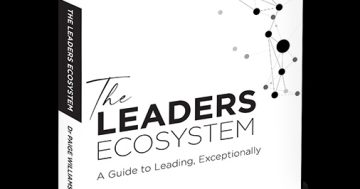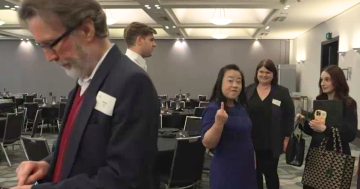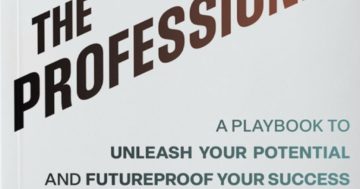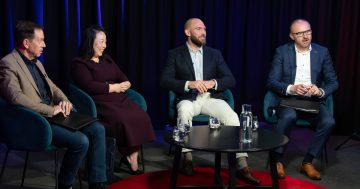Pia Lauritzen* says asking questions and listening to the questions of others helps leaders make better decisions.
 It has become a habit of mine to kick off my presentations by inviting people to write down a question.
It has become a habit of mine to kick off my presentations by inviting people to write down a question.
I ask people to follow two rules: the question must be relevant to the context—typically, leaders meeting in or across organizations to discuss leadership—and it must be important to the person asking the question to get an answer.
After two minutes of reflection time, 90 per cent of the people in the room have written something down.
That’s when I ask them: Is it hard to come up with a question in a situation in which they know nothing about what’s going to happen next? Most of them say yes, because the exercise has forced them to:
- make up their mind about what’s important
- take other people’s situations into account
- think of their input in light of a shared goal.
By the time I start sharing my research on the nature and impact of questions, my audience will already have experienced and explained to themselves, and to one another, why successful leaders love questions: it’s because asking, listening to, and answering other people’s questions makes them better leaders.
Indeed, there is a methodology, derived from six ideas from great thinkers, for harnessing the power of questions that can help leaders make better decisions and be more empathetic and purpose-driven.
I call it the magical question triangle (see figure).
Building an inquiry-driven culture
Having worked as an advisor to executives for 18 years, I have never come across another theory, method, or tool that in two minutes helps leaders make up their mind about what’s important, take other people’s situations into account, and think of their input in light of their company’s or team’s common goal.
So, what is it about asking questions that makes leaders spontaneously do so quickly what no carefully designed manual or process manages to do? Let’s take a look at the ideas that make up the magical question triangle.
- Only humans ask questions
The first time I invited people to ask a question at the beginning of a presentation, I was relying heavily on an insight from the German-American neurologist Erwin W.
Straus, who helped pioneer anthropological medicine and psychiatry:
“The act of questioning cannot be taught.
“Nor does it require a teacher.
“The first question arises early in the life of every healthy child, from the very roots of its existence.
“We are able to ask single questions because we are questioning beings at our very core.”
In his 1955 article, “Man, a Questioning Being,” Straus makes a compelling case for understanding human beings as “question-animals.”
So why not trust that with the relevant context and some reflection space, every human being knows how to ask insightful questions?
The first ten seconds of the presentation where I put this idea to the test were difficult.
The hundreds of leaders in the room looked confused, but it didn’t take long for their expressions to change, and as I watched from the stage, they instinctively transformed their confusion into curiosity.
After half a minute, they were writing down their questions, and when the two minutes of reflection had passed, everyone was eager to share.
I had activated a collective superpower, one that defines and distinguishes humans from most other creatures: their curiosity.
According to French philosopher Maurice Merleau-Ponty, a contemporary of Jean-Paul Sartre, neither complete not-knowing beings (animals) nor complete all-knowing beings (gods) can ask questions.
Being a “fragile mixture” of the two, we humans have a unique disposition for wanting to increase our knowledge—and we do that by asking questions.
Because we know that we don’t know all there is to know, it only takes us a few seconds to tap into a collective consciousness telling us that we depend on each other to find the answers to our questions.
I see this in action during my presentations.
- Questioning makes us better problem-solvers
After inviting leaders to ask a question, I ask them where they expect to find the answers.
I give them three options: (1) in themselves, (2) from another person, or (3) from doing research and asking more questions because they don’t believe anybody knows the answer (yet).
Most leaders choose either option one or two, which suggests that leaders’ main reason for asking questions is to get immediate answers.
According to Albert Einstein, asking questions should not be about getting answers, but rather about solving problems.
And to solve the wicked problems of our uncertain world, leaders must resist the temptation to rush to an answer.
Einstein is purported to have said, “If I had an hour to solve a problem and my life depended on the solution, I would spend the first 55 minutes determining the proper question to ask, for once I know the proper question, I could solve the problem in less than five minutes.”
Leaders who want to make sure they solve the right problems at the right time should follow Einstein’s lead.
- Questions are data
By giving the leaders three options for where to find answers, I changed the classical conference dynamic.
Instead of just introducing the concept of the wisdom of the crowd, I asked the leaders to direct their questions at one another; according to Straus, there is no better way to mobilize and map the collective intelligence of a group.
In “Man, a Questioning Being,” he writes, “Questions are as revealing as dreams, or even more so.
“As their selection depends on historical, social, and cultural conditions, a full inventory of the questions that have animated and agitated or failed to disquiet a person, a nation, or an epoch gives us deep historical insight.”
A modern way of saying this is that questions are data.
Leaders who want to leverage this data should focus less on answering everyone’s questions themselves and more on making it easy for the people they are talking to—their employees—to access and help one another answer the questions that have the biggest impact on the company’s overall purpose.
For example, part of my work with large companies is to help leaders map what questions their employees are asking one another and analyse the group dynamics in their organization.
This gives leaders a way to identify critical problems and at the same time mobilize the people who need to solve them.
- Questioning forces us to make important decisions
Comparing questions to dreams is Straus’s way of saying that questions hold the key to better understanding the subconscious dimensions of the person asking the questions.
It can be extremely difficult to understand why employees think the way they do, and how to help them change their mindset and behaviour if required.
It then stands to reason that questions might also help leaders better understand the culture and habits of their organization.
In his 1988 article, “Toward a History of the Question,” Dutch philosopher C.E.M.
Struyker Boudier writes, “In and by way of his questions the human being can reach out to the divine, and likewise degrade himself to the demonic inferno of evil.”
Questioning forces people to the line between good and bad, yes and no, pro and con.
Asking questions is closely related to making a choice.
We cannot address everything at once, so to ask a question, we must decide what to focus on and how.
We have the choice to take an approach that is optimistic or pessimistic, abstract or concrete, individual or collective, broad or narrow, past- or future-oriented, etc.
Leaders look confused when I invite them to ask a question at the beginning of my keynotes because they are not used to making decisions without new information or insights.
By formulating their question at the outset, the leaders activate their own thinking before listening to mine.
They are more likely to be focused on what they believe they have to do differently rather than to practice what they may learn.
The key to changing the culture of an organization is not to tell people what to do, but to make it easy for them to ask the questions that make them consider their current behaviour.
Only by making room for their colleagues, employees, and other stakeholders to ask their own questions and activate their own experience and insights can leaders ensure that people’s buy-in to new initiatives is an active choice, and thus something they feel committed to acting on.
- No questions=no change
Making room for other people’s questions sounds easy.
But it’s not.
There are no guarantees that people will transform their confusion into curiosity.
That first time I solicited questions at the beginning of a talk, the silence that followed was uncomfortable because I trusted neither my own decision to put my presentation on hold nor the leaders to make the right decision and write down a question.
If their glances hadn’t started changing, I would have felt the need to save the leaders—and myself—from the terrible silence.
But their glances did start changing.
And it only took ten seconds.
Why? Because as German philosopher Hans-Georg Gadamer put it in his 1960 book, Truth and Method, “One cannot build experience without the activity of asking questions.”
This also applies the other way around: when we ask questions, we are both open to new knowledge and willing to learn from that knowledge.
That’s why we ask! And that’s why leaders who truly want to help their employees to learn something new—and empower them to develop new solutions themselves—must trust this motto: no questions=no change.
- Questions drive social networks
The decision to trust the process of asking and listening to other people’s questions is also a decision to think of questioning as part of a social process—something we do to better understand ourselves and the people surrounding us.
But the desire to understand ourselves and each other is not the only socially motivated reason we have for asking questions.
In her 1978 book, Questions and Politeness: Strategies in Social Interaction, anthropologist Esther N. Goody writes, “Questioning not only involves asking for information, but also carries a command function.
“Questions are speech acts which place two people in direct immediate interaction.
“In doing so, they carry messages about relationships, about relative status, assertions of status, and challenges to status.”
This should be a reminder to all leaders to pay close attention to when, how, and for what they use—and don’t use—questions.
Deciding who is allowed to ask questions and who isn’t is a powerful way to distribute responsibility.
The question, then, that all leaders must ask themselves is: “How do I use this power in a good way, empowering everyone to take responsibility for the context they are part of?”
I’m not arguing that every time someone asks a question, everyone automatically becomes better at being human, solving problems, sharing knowledge, changing their behaviour, trusting themselves, and taking responsibility for their company or community.
Rather, when leaders work systematically to activate the magical question triangle, the potential for all these things to happen in their organization increases significantly.
*Pia Lauritzen is an advisor to executives and cofounder of Qvest, a technology company that developed a platform for creating responsible organizations in which people work together to reach important goals.
This article first appeared at strategy-business.com











